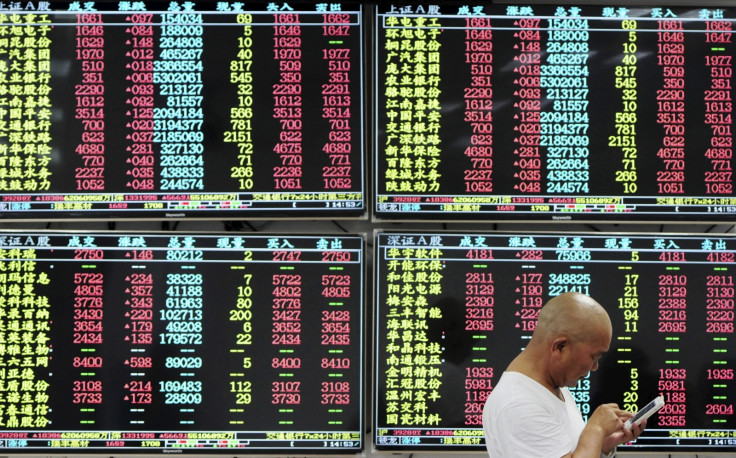China's Black Monday: What the experts are saying about market turmoil

Two days of turmoil on the Chinese stock exchange have had far-reaching implications, with billions wiped off global bourses. Slowing growth in the world's second largest economy has spooked investors in Chinese stocks, which has had a ripple effect on stock markets across the world.
Beijing responded by cutting interest rates 0.25% to 4.6% in an effort to calm the storm. IBTimes UK looks at what the experts are saying about the long-term implications of a tumultuous few days.
Salman Ahmed, Lombard Odier's global fixed income chief strategist
"China was wrong to allow the equity market bubble to develop. It is important to acknowledge the policy mistake made by Chinese authorities when they actively encouraged a bubble in domestic equity markets.
"The sharp fall since then has erased around 38% from total market-cap and has brought into focus a well-known weakness of the Chinese growth model, namely over-reliance on leverage. We think China has capability to backstop the system, which supports the case for differentiation.
We continue to think that China has the capability to backstop its financial system. However, that doesn't mean that the confidence shock we are witnessing will go away quickly.
"Given its external financial situation [as a net creditor in the world] and high liquidity profile of the asset side of the country's external balance-sheet, we continue to think that China has the capability to backstop its financial system. However, that doesn't mean that the confidence shock we are witnessing will go away quickly.
"We think it would require a concerted effort by Chinese authorities to restore their credibility and effectiveness when it comes to back-stopping the system."
Didier Saint-Georges, managing director and member of the investment committee at Carmignac
"At this stage, we are talking about an economic slowdown, not a meltdown. But the markets are vulnerable because of the conjunction of two key weaknesses:
One, the bull market has been driven mostly by a rerating thanks to zero-interest rate policies and QE. Valuations suggest that this rerating is over, therefore earnings growth needs to take over, which is unlikely in our opinion. Twol boxes have been pretty much exhausted: governments have no budget flexibility, rates are at zero and QE is maxed-out.
The bear case would be that investors not only lose trust in China, but would also lose faith in the fact that central banks have the capacity to support asset valuations and/or economic growth."
Nigel Green, CEO of deVere Group
"In terms of what investors should do, it is not 'sell in a panic', or the opposite reaction: 'fill your boots with bargains'. For most long-term investors, it is 'keep calm and carry on'. It's nearly impossible to predict what the stock market is going to do in the immediate future – and it is much too early to say if the current sell-off is nearing its bottom.
"However, stock markets can be fairly predictable over long periods of time. They tend, over time, to go up over multi-year time periods. With this in mind, a sensible strategy is dollar cost averaging.
"Investors need to ask themselves 'Will stock markets be higher than this when I retire?' Looking at financial market history, the answer is probably 'Yes', if they have a decade or more ahead of them. So, logically, they should carry on buying as markets fall."
Christoph Riniker, head equity strategy research at Julius Baer
"Chinese equity markets have again lost substantially, putting further short-term pressure on European and US trading. Looking at various indicators, the negative sentiment is meanwhile clearly reflected in the markets.
"However, taking a longer-term view shows that more negative is still possible. It is therefore too early to say that we see buying opportunities at current levels. As long as we do not know how the Chinese government will react in regard to their domestic growth we would rather stay on the sidelines.
"However, the longer-term fundamental assessment still points to better market conditions going forward. The only problem we currently have is the unknown time span between today and the point when fundamentals become more pivotal again. We see positive fundamental factors for Western equity markets but would not recommend bottom-fishing right now."
Ken Odeluga, senior market analyst at City Index
"The collapse of China's main stock market on Tuesday [25 August] by an amount that was just slightly smaller than the day before encouraged China's central bank to act, with a raft of Required Reserve Ratio cuts for banks of all sizes including a 50 basis point cut for the largest.
"I suspect the impact on China's stock market on Wednesday will be similarly modest. What will be more important for the market to watch will be the speed with which China 'normalises' RRR back to the base it was reduced to after the 2008/2009 crises and, perhaps more critically, whether the PBOC is prepared to go beyond that 17% floor, despite attendant near-term risks to its reputation among others.
"China's stock market and, rationally or not, global equities too, in the medium term, will largely hinge on any hint that the PBOC is prepared to cut further."
© Copyright IBTimes 2025. All rights reserved.






















